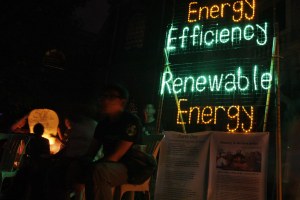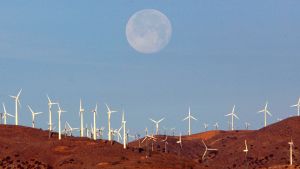Energy Insecurity: Where Climate Change Meets Geopolitics
 Play Podcast
Play Podcast
About the Episode
How is energy insecurity shaping the world's power dynamics? From the urgency of collaboration to the delicate balance between environmental sustainability and national interests, guests Jason Bordoff and Meghan O'Sullivan offer a fresh perspective on the complexities of green energy underlying our modern global landscape.
- The Age of Energy Insecurity: How the Fight for Resources Is Upending Geopolitics, Jason Bordoff and Meghan L. O’Sullivan, Foreign Affairs, May/June 2023
[Brian Hanson: INTRO: This is Deep Dish on Global Affairs— going beyond the headlines on critical global issues. I’m your host, Brian Hanson, with the Chicago Council on Global Affairs.
Many people assume that the global energy transition to address climate change - moving from fossil fuels to non-carbon sources of energy - will be a relatively smooth, incremental process. And that the shift from fossil fuels to green sources, will address climate change, eliminate concerns about energy security, and free us from the geopolitics of fossil fuels and the outsized global power of countries that supply fossil fuels such as Russia, Saudi Arabia and others.
My guests today challenge this conventional wisdom. They argue that the transition to green energy sources will not be the end of the Geopolitics of Energy, but rather will create new challenges, and new sources of geopolitical power. Unless we proactively address those issues, not only do we risk exacerbating geopolitical conflict, but also could put our climate goals at risk.
Here with me to explore these issues are Jason Bordoff and Meghan O’Sullivan, who have led the thinking on these issues.
Jason is the founding director of the Center on Global Energy Policy at Columbia University, and also spent time in both the Clinton and Obama administrations, including in the role of senior director for energy and climate change for Obama’s National Security Council.
And Meghan is the director of the Belfer Center for Science and International Affairs at Harvard’s Kennedy School. Previously served in multiple government roles, including as a deputy national security adviser in the George W. Bush administration.
Together they wrote an important recent article in Foreign Affairs titled "The Age of Energy Insecurity," which is linked in the show notes. And we’ll be right with them after a quick word from today’s sponsor...
(AD BREAK)
And we’re back with Jason Bordoff and Meghan O’Sullivan. Meghan says that the global energy transition is really about moving away from high carbon admitting sources of energy to low carbon…]
Meghan O’Sullivan: and then ultimately to get the global economy to a place where we have a net 0 emissions in our economy. I specify that it's not necessarily about moving away from fossil fuels. We often use that as a shorthand, because there is the possibility we're not there yet, but there's a possibility that we could divorce fossil fuels from their carbon emissions. What we don't like are the emissions that currently come with fossil fuels. So, it's really about emissions and getting to a place where the global economy is net 0. Why is it so hard? It has to do with the fact that, when we conceptualize this, we might just think oh, it's moving from one energy source to another energy source. And at some level it is. But when we think about the scale of the problem what we're actually talking about is remaking the entire energy system. We're talking about changing how we use, store, transport, generate energy. This is a huge thing and energy, of course, is the backbone of the global economy. So, we're talking about remaking the backbone of the global economy and not,in some time in the next 100 years, we're talking about doing it in a generation. And so, the scale of the problem is really enormous.
Jason Bordoff: Yeah, I would just add to why transitions are so hard. I think one thing to keep in mind when we use the phrase energy transition, which people throw around quite liberally the history of energy teaches us that we've never seen an energy transition in the kind that we need for climate change. We've seen energy additions. And what I mean by that is if you think of an energy transition, your listeners might think of a chart going back to 1850 to today and going from zero to 100%. And you see these great shifts over time where we go from wood to coal and then coal to oil and then to gas and then low carbon energy. That's true as a percent of the total. But what the climate cares about is total energy use, total metric tons of carbon that we're putting into the atmosphere. And we've never used less of anything. If you look at the amount of wood we're using today, it's greater than it was a hundred years ago. Because total energy use keeps rising. So, the shares of the total are changing, but we're using more oil, more coal, more wood. If you want to get to net zero... You need to not only meet all the demand growth in clean energy with zero carbon forms of energy, you need to take the 80 percent of the energy mix today that is still fossil fuels, and that 80 percent has not changed for decades and bring that to zero or capture or remove the CO2 associated with it. That's a sort of task. And we're doing that at a time when the world is getting wealthier, the world's getting more populous. I'll give you one example, which is if you think about the goals that India has for decarbonizing its energy sector, it has pledged to go to 500 gigawatts of solar, and renewables by 2030. To achieve that, it would need to take the best year it's ever had for renewable deployment, which was last year triple it and do that every year between now and 2030. And coal use would still be the same in 2030 as it is today because it's 1. 4 billion people and it's getting larger and wealthier and a rapidly growing economy.
So, these are really difficult challenges when you think about the scale and magnitude of the global energy system.
Brian Hanson: Yeah, that really is an amazing image there. In addition to the challenge of making that kind of transition, you two, when you're writing, really focus on the importance of energy security in this transition. And all of us have been reminded of the challenges of Insecurity, with Russia's war on Ukraine and having to adjust very quickly to, the fuel supplies. One of the things that's really striking in your argument is that rather than like many people kind of assume, oh, this is going to reduce energy and security because the solar is local and the wind is local and all. You argue that in fact, as we go through this transition, it could exacerbate energy insecurity and in ways that could actually undermine our efforts to address climate change. Why is that?
Jason Bordoff: The promise you describe is correct and what the future can eventually hold. As you said, a clean energy economy is one where much more of energy is coming from electricity. Electricity tends to be more locally produced. It doesn't make a country depend as much on the global trade and hydrocarbons inevitably exposed to geopolitical risk like oil and gas. I think what Meghan and I have tried to identify is that when we get to a net zero world decades from now, hopefully that new clean energy economy will bring some new risks. We need to think about like dependence on critical minerals that are much more concentrated today and where their mind and refined and process that we need for batteries and solar panels. We've also been thinking a lot about the end state is very far away, and we want to make it as close as possible, but it is at least decades and the process of getting from here to there that process of how we navigate a managed decline of the old with the rise of the new. In ways don't get one ahead of the other could raise on its own new sources of volatility, market uncertainty, swings in geopolitical influence and power that we also have to anticipate. So, this is going to be a more disorderly and jagged multi decade process of transition, and we need to think about how to de risk that as well.
Meghan O’Sullivan: And let me, Brian, take the point that you made about how energy insecurity could potentially jeopardize the overall transition. And so, we try to emphasize the importance of a speedy transition and the need for the global economy to undergo this energy transition. But what we try to highlight is something that has now become much more evident to those who have seen what has happened after the Russian invasion of Ukraine is that if. We move ahead in a way, or at a cadence that leaves populations energy and secure that could erode popular support for some expensive and difficult, changes that are going to be required throughout the course of the transition. it can't be done cheaply, which doesn't mean there can't be economic upsides to it, but it does require a certain amount of political effort and marshalling of political will. And when leaders in democracies in particular are faced with challenges of Providing people, you know, enough energy to heat their homes or to eat or, in the case of some European countries, just to continue regular economic activity. This can again, erode the support for what could be a difficult transition. And I think in the wake of the Russian invasion of Ukraine, and we look what's happening in Europe and we see, there are multiple reasons for it, but, you know, Germany now in recession and, some people call what's happening in Germany. Deindustrialization. And part of this has to do with, Germany's relationship and reliance on Russian energy over time. But it also, has to do with an economy that has prioritize other things besides access to affordable energy. So, we've got a year where we're looking at a lot of European elections, and a lot of people are anticipating that the far right could do well in many of these elections, in part fueled by some concerns over energy and security.
Brian Hanson: I think one of the other things that's really striking that you lay out is how geopolitically, as we make this transition, in some ways, the traditional fossil fuel producers are actually going to be strengthened or have the potential to be strengthened. Can you lay out what this concern is and how it might unfold?
Meghan O’Sullivan: So, building on Jason's earlier point about how it's really the transition that we're focused on, rather than the end state. I always say it's a nice cocktail party conversation and look forward to getting there. But the decades between now and then are the ones where this transition is really either going to happen at the speed the world needs or it's not. And that transition, is very hard to synchronize. Because this is not exclusively a market driven transition, there's a huge element of policy in it. And that adds insecurity because policy can move forward and can also move back. And we've seen that just recently in the UK, where you had the prime minister there moved back some climate goals that had been set not so long ago. So, there's an element of uncertainty and an element of back and forth. And what happens is that it's going to be very easy for supply and demand to get out of sync at various points in time. And if that happens for, let's just take oil, since that's the easiest example, and since the world has seen over the last couple of years, various points where the supply coming online is not exactly, or not well synced up to the continued rise in demand. That actually empowers traditional producers of oil. So, until recently the investment in oil was far below what was needed to meet the rising demand for oil. And that was in part, because people thought oil is a fuel of the past, and if oil is a fuel of the past, why do you want to invest in it? And that wasn't really synced up to the reality that oil might be perceived as a fuel of the past, but every year, the world is using more oil than it did the year before. And so, you've got continued rising demand, and not continued rising investment in supply. And so, again, that creates desynchronization and that creates high prices and that creates geopolitical leverage for countries like Saudi Arabia that have a lot of leverage because they are able to bring more oil online in short order. And really, they're the only ones that are able to do that.
Jason Bordoff: And important point to make is that what is needed is not a lot more investment in oil and gas supply. It is to try to, as much as possible, drive demand for oil down, so that we can achieve our goals. But the risk Meghan's identifying is if you don't synchronize those things, if you stop investment in supply. Before demand starts to fall, you have the potential for tight markets, price spikes, and then if we have price volatility, we see in Washington, DC, that is not something that is politically or economically acceptable, and politicians will do whatever they can to try to bring those gasoline prices down, and there's not many levers to pull other than, say, turn to Saudi Arabia, which, as Meghan said, is the only country that holds a meaningful ability to ramp up supply In the immediate term, it's also the case that over a multi decade transition, the total amount of oil may start to decline. The share of that, that comes from OPEC countries will probably rise. So, it's a shrinking denominator, but still for many decades can be a meaningful number and more concentration in OPEC countries as total oil use does start to decline.
Brian Hanson: And why is that?
Jason Bordoff: The share of supply that would come from OPEC, is projected in these various scenarios moving to net zero to increase just because they're the lowest cost suppliers. So, if you imagine that the highest cost sources of supply would fall off the curve, so to speak, first. The last producer standing would be, you know, the UAE, Saudi Arabia, ones in the Gulf and elsewhere that can produce most cheaply. It raises an interesting question, which is in a world of declining demand, who does get to be the last producer standing? Some will say it just markets will figure that out. It's the cheapest barrel is the last one. Some maybe should say it's the lowest carbon emission barrel, they're not all the same. If you're in an emerging and developing economy, you might say maybe it should be us because Norway and Texas and Saudi Arabia got to become rich, maybe we can develop our resources. So, there could actually be some conflict among countries, and everybody will want to be the last producer standing, and that makes it even harder to think about how we have managed decline globally.
Meghan O’Sullivan: And just adding to that point, I think also again, policy will come in because there will be some leaders of countries that say we're not comfortable with having the last producer standing all be, say, in the Gulf and that they would like some of the production to happen inside their country, even if it. isn't the most economical. So again, a lot of unpredictability that could have to do with policy that could have to do with the perceptions of national security.
Brian Hanson: So that's the kind of the legacy producers of fossil fuels. Another thing that you all emphasize in your work is new sources of power. You've mentioned kind of their new minerals that need to be dug out of the ground, as well as they need to be processed and turned into the products that we need for the green energy, transition and presumably. These also create new opportunities for countries to try to control those supplies along that supply chain in order to, gain advantage, both economically, but also in terms of power, right? can you break down what are the things that are most important in this transition in terms of those, new capacities, those points that get created and who might exploit them?
Meghan O’Sullivan: There are a list of critical minerals, and this list is formulated by the US government. They've identified 50 minerals and the assessment, it's not on some objective, scope. It's basically deemed critical because of, critical nature to the US economy or in conjunction with having a vulnerability when it comes to supply chains. So, I would say the vast majority of these critical minerals, the US imports more than half of them. And in some cases imports, all of the supply, and in many cases, we use a relatively small amount of it. But if we import it all, and it has an absolutely critical nature, maybe what if it comes to a defense capacity, then it's deemed to be critical. And these minerals have been around for some time. The reason they're getting so much attention now is because so many of them are critical components. In clean energy technologies, and so if we look at what needs to happen in building up that renewable energy, or that low carbon, zero carbon energy capacity over time, the world is going to need so much more of many of these critical minerals, be it lithium, be it cobalt, coppers not technically a critical mineral, but that's certainly one that it's getting a lot of attention. And so, there are 2 questions here. One is, can the world actually produce the amount of these minerals that is needed just Collectively, can we produce enough to meet the demand? And I think that's very much an open question. It depends mineral by mineral, but in some cases, the averages will need 6 times what the world is producing today to meet the energy transition needs. But if you look at individual minerals, sometimes it's 10, 20, 30, maybe even 40 times what the world is producing today. The 2nd set of questions have to do around vulnerable supply chains. And Brian, what you were saying about geopolitical leverage, because so many of these critical minerals are the supply chains are dominated by China. In many cases, China is the producer, of these minerals and particularly rare earth elements, but in many, many cases, even if they're not the producer, they're the processor. So, even if something is mind in the Congo, it goes to China to be processed before it goes to the rest of the world. And that's where policymakers in many countries are very nervous about the fact that China has the ability to slow down elements of the energy transition should it deem to be sensible. But that's a big caveat, just because China has that ability doesn't mean that ability is going to last forever. Doesn't mean that ability is going to translate into overwhelming geopolitical influence and doesn't mean that China is going to want to exercise that ability, but it certainly is a vulnerability. And it's one that, policymakers still have a long way to go and understanding it entirely. Never mind addressing it adequately.
Jason Bordoff: There are other examples like that, where a clean energy economy will mitigate many of the old energy security risks we've thought about in the past and raise some new ones. Critical minerals probably top of the list. Another example might be a grid that is much more dependent on renewable electricity like solar and wind that isn't always there. It's intermittent. The sun doesn't always shine. The wind doesn't always blow. The power systems need for flexibility. The ability of the system to adjust to handle changes goes up very significantly, and you got to make sure the grid can handle that. I do want to say that none of this is a reason why we should not have a much faster clean energy transition. First, if we don't, the impacts of climate change are going to be devastating. And these are solvable problems. We know how to manage the grid. We just have to make sure we do it and we get ahead of the problems that might emerge. We know how to solve a lot of these critical mineral challenges, and I think they may well be easier to solve than the ones we've thought about for the last 50 years, say, since the Arab oil embargo. So, despite sometimes being labeled rare, there's plenty of critical minerals around the world. The concentration and dominance China has now is not actually in mining. It is refining and processing. You can do that activity in lots of places. If you just do the investment and it takes some time to build those supply chains, there's a lot we can do on the demand side where new battery chemistries or recycling might reduce what we think the need for those critical minerals is. So, if we anticipate these challenges we're identifying, there's a lot we can do to reduce them and mitigate them and get ahead of them because we need to accelerate this transition pretty quickly, as we've seen this summer and almost every day with the impacts of climate change.
Brian Hanson: So that answer is terrific because it drives us toward where I wanted to go, which was, what do we do? And how do we think about who needs to act? Is this something the US can do on its own, that the US does with allies, that there are multilateral processes? So, what's that agenda forward and who needs to be involved in it?
Meghan O’Sullivan: I'd say the first thing that is required, and this is not going to be a surprise to anyone. It's just the imperative of diversifying. This has been true in terms of guaranteeing energy security throughout the ages. people have always thought about diversification as being the best way to stave off energy and security in a world of oil and gas. And this is going to be true in critical minerals. It's going to be true in a variety of other things. So, diversifying the critical minerals and the supply chains is really, really important because even though there may be some policymakers who think that America can produce all of the minerals it needs within its own borders, because that's a fashionable thing to think that energy independence is possible. This is a different form of energy independence, but it still sounds attractive. The reality is there's so many economic and social and political reasons why that's going to be, I would say, nearly impossible. So, we have to, instead of just saying, well, we're going to rely on China to provide a lot of these minerals, or we're going to produce the wall in America, we're going to have to diversify these supply chains. And that's going to be, complex because it's going to be involving getting friends and partners and allies, and then some countries that we may not have great and close relationships with to invest in their own production capacities and even more importantly, and I guess I should say, is the processing capacities. And so getting them to do that may require encouraging finance to flow in that direction, but in my mind, and Jason and I have written about this, it probably also will involve revisiting some of our aversion to free trade and talking about market access for countries, because to make these big investments that only pay off over a long period of time, countries are going to want to know that they have access to markets to sell The products that they produce. So, I do think there's a lot of policy implications just if we focus on, one critical element or objective, which is diversification.
Jason Bordoff: I talked about the flexibility needed in the power sector, and there are so called capacity markets where redundant power capacity that can be brought online. There's an economic mechanisms to incentivize that, you know, you have different policy solutions for each problem at a broad level. As Meghan said, there are some capabilities general principles that have been true for a long time, but they take on different forms in a clean energy world and a process of transition diversification. As she said, we've argued that it's important to continue to have integration of global energy markets, not be isolated, that actually the more connected global market as we saw in Europe weaponized its gas exports cut off gas supply to Europe and Europe, it was economically painful. But Europe was more able to cope with that because they could enter the global market for liquefied natural gas and pull in supplies that maybe otherwise would have gone to Asia or somewhere else. We should anticipate this is going to be a jagged and volatile and messy process of transition. That probably means you need more guardrails to deal with unexpected shocks and volatility.
Brian Hanson: There's no doubt that's more needed to be done there. But is that enough? Is that the right way to think about, the kind of effort that we need that individual countries make their own policy adjustments or does there's need to be something broader than that? Which can be hard, right? In this period of increased geopolitical competition of various kinds where we have not seen that, you know, when it push came to shove in the pandemic, that wasn't what was on display that broader cooperation. How do we think about who needs to take these agendas on?
Meghan O’Sullivan: I would say we're in a moment of real flux on this question that for the last 30 years, the world has largely looked to a cooperative approach towards climate, which really made sense because of the nature of the problem you have. The problem is carbon emissions and carbon emissions are not tied to any particular country or don't respect national boundaries. And so, this is a transnational problem. And therefore, having a global cooperative approach seems like a reasonable way to progress. And I would say, for the last 30 years, there's been, a moderate amount of progress, certainly a much more focus on this, more country plans to address bringing down carbon emissions certainly has fallen short of what we need or what the aspirations have been. But now I think this approach is being called into question by as just like the nature of the geopolitical environment. Too often I think we forget that geopolitics as much as technology or policy will have an impact on how quickly this transition is completed, or even whether it is completed. And we're in a very, very tight and difficult geopolitical situation right now. And in this geopolitical climate, the major, the dominant dynamic is 1 of international competition. And so, I would say, up until very recently, the approach has been like, well, climate so important. Let's just make climate an exception to that competition. But. I think there's a growing realization among policymakers and others that we can't expect climate to be an exception that we have to find a way to make our climate approach more consistent with the competitive reality of the system. And I think it's created an impetus for some really interesting policy approaches like the inflation reduction act. Which is this new wave of industrial strategy, a completely new approach to dealing with the question of climate, which has spurred a lot more action in the US, but it also has spurred some unintended consequences, which may have downside when it comes to the global picture as well. So, I'll just finish. I know Jason will be able to add more to it, but it's, of course, not just a question of countries. It's always also a question of companies of individuals of foundations every actor in society has a role to play here. And, as we've seen over the last several years, you know, there, there is action at many different levels and all of that action will eventually be necessary.
Jason Bordoff: Climate change is the sort of ultimate global tragedy of the commons problem. It doesn't matter where a ton of CO2 comes from. They all contribute equally to the problem. So, you need cooperation. we need more partnership, not less. So, think about where the critical minerals are going to come from, how much nickel exists in a country like Indonesia. And Indonesia has said, well, we don't just come here and take our minerals. So, they've put in place export restrictions where the refining and processing needs to be done in Indonesia. They're now thinking about adding yet further restrictions so that the refined nickel can't be exported. You have to build the manufacturing plant in Indonesia because they want all of that downstream economic activity. And then everybody starts to do that. And that becomes a real barrier or inflict cost inflationary for the clean energy transition because we lose the gains of trade that exist if everyone's doing you know what they're good at. And so, when people start to look at the industrial policy, the new trend we're seeing. Inflation Reduction Act being one example, motivated by many things, domestic jobs, resilience of supply chains, everyone saying you can't have 90 percent of anything be in one country, energy security, all of these claims are now being brought to bear to try to onshore or so called friendshore your activity, and if that's not done carefully, it can pose risks to the energy transition, and in some cases also spark backlash, which we are definitely seeing an increasing amount of from emerging and developing economies that feel like they did not cause this problem. The developed countries are not making good on our pledges to assist them, and they might, you know, be left behind, and they want to develop their own resources.
Brian Hanson: So, as we bring this conversation to a close, we're about to enter an election season in which many of these issues are also going to be things that are widely discussed. And my question for each of you is, what would you encourage our listeners to pay most attention to as they listen to these debates and think about what is the best path forward?
Jason Bordoff: It'll obviously depend who the candidates are that I think we probably know who the Democratic nominee is, and at least there's a leading candidate on the Republican side. But broadly speaking, I think it will be certainly important to retain a focus on the urgency of doing something about climate change and continuing to take stronger action to deal with it. You don't have a solution to climate change without dialogue and engagement with China in in some capacity. And I guess, in this election. I don't know that foreign policy will play a very significant role, except in one or two cases, but America's place in the world. It is important for the United States to play a leadership role in continuing to have alliances, continuing to build global partnerships in a time of fragmentation and retrenchment when that is not in vogue, really, on either side of the aisle, and I think, the clean energy transition motivated by the urgency of climate, it's the ultimate problem that requires a global cooperative approach, and that's in many ways getting harder, not easier.
Meghan O’Sullivan: One I think is really looking to see where support or lack of support for the inflation reduction act approach goes. There some on the Republican side who, who say we'll defund this. We'll try to put an end to it. I think that's less and less likely to happen as more and more Americans benefit from the approach that's adopted in the IRA. However, I think that's going to be a real bellwether about how serious the United States is going to be on climate action. The last thing that I'd be watching, and I don't actually expect to see this, but I would love to see in the context of our debates and acknowledgement that we hear about China and India and the developing world and their approach to carbon emissions in debates and in other places, but it's always in the context of if they're not doing it, why should we do it? And what we really need to have is a conversation about how can we help them do it? Because as we've said, in other contexts, 88 percent of future carbon emissions are going to come from places outside of the United States, and if this is truly a global problem, it's not going to be solved unless the rest of the world, not just gets on board, but actually has a feasible way of reigning in future carbon emissions without compromising their pursuit of economic growth and prosperity. And until the West or the developed world sees that as not just like a competitive thing, but part of their problem as well. I just don't see how the world is going to get to where it needs to be.
Brian Hanson: Meghan O’Sullivan of Harvard’s Belfer Center and Jason Bordoff of Columbia University -- I want to thank you so much for being on Deep Dish and helping us really develop a more sophisticated understanding of what this energy transition is going to be like, some of the issues that we're going to need to grapple with in order to successfully get to where we want to go.
Meghan O’Sullivan: Thank you, Brian. It's been a pleasure.
Jason Bordoff: Thanks for such a thoughtful conversation.
[Brian Hanson: OUTRO: And thank you for tuning in to this episode of Deep Dish.
A reminder that we want to hear more from you, our listeners. So, send us an email or, better yet, a voice memo, to deepdish@globalaffairs.org You can suggest issues you’d like us to cover, guests you’d love to hear from, or you can just let us know how you think we’re doing.
And if you are looking for more Deep Dish in your podcast diet? Tap the “follow” button in your podcast app so you get each new episode as it’s released. If you think you know someone who would like today's episode, please "share" it with them!
As a reminder, the opinions you heard belong to the people who expressed them and not the Chicago Council on Global Affairs. This episode is produced and edited by Kyra Dahring and mixed by Frank McKearn from Aphorism Productions.
Thank you for listening. I’m Brian Hanson and we’ll be back next week with another slice of Deep Dish.]






Related Content
 Public Opinion
Public Opinion
The war in Ukraine has shifted public opinion toward energy independence, renewable power, and nuclear energy.
 Tech and Science
Tech and Science
The public also remains concerned about the potential for a global economic downtown, Council polling shows.
 Public Opinion
Public Opinion
Russia’s war in Ukraine has sparked a domestic push toward alternative energy sources.
